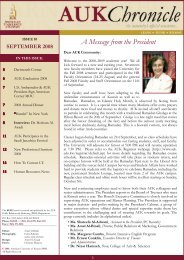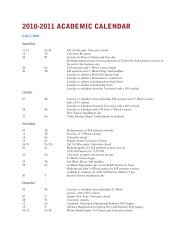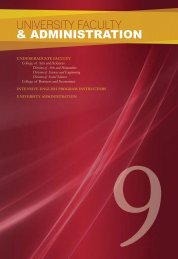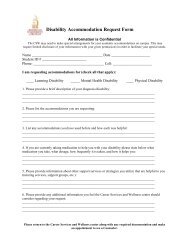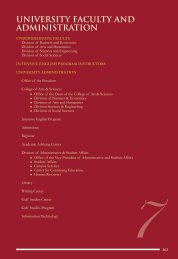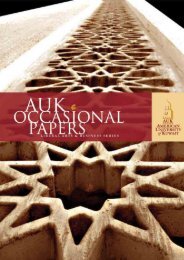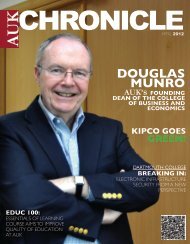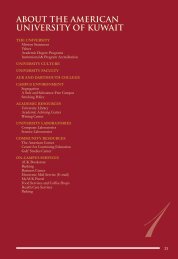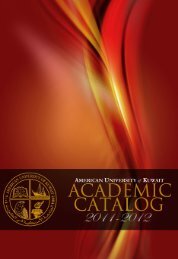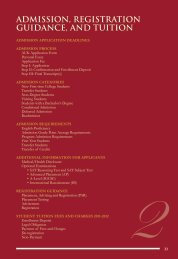for quality assurance, an organizational structure mightbe created that would accommodate western liberal artseducation in a traditional setting.8.0 Discussion Questions:Having briefly examined some potential solutions, variousquestions remain:1. Is the current course being taken by newly establishedprivate Gulf universities leading to desirable outcomes?If not, is the course reversible? To what extent are theabove proposals for improving the current situation plausible?2. Can private universities with their current structuresface up to the serious academic challenges that lieahead without addressing wasta? Do the solutions liesimply in reversing the priority of the objectives ofmaximizing financial gains and academic quality?3. Convention dictates that higher academic standardsenable a university to attract better qualified professionalfaculty and administration as well as students with higheracademic standards who are eager to learn. Can privateGulf universities maintain quality education and stillattract customers? Is it possible to have both?Alternately, will enrollment quotas be met at the expense ofacademic standards?4. Can liberal western-style education be adapted in theArabian Gulf and circumvent an all or nothing adoptionpremise?References1. Abbott, Andrew, “Welcome to the University ofChicago, The Aims of Education Address” (for theclass of 2006), Sept 26, 2002, University of Chicago.2. Al-Khaldi, Khalil, “Replace Incompetent Top Brassat Ministry of Education”, Arab Times, January 20, 2005.3. AAC&U (Association of American Colleges andUniversities), Statement on Liberal Learning, 1998.http://www.aacu.org/About/statement/liberal_learning.cfm4. Bagheri, Khosrow and Zohreh Khosrawi, “The IslamicConcept of Education Reconsidered”, American Journal ofIslamic Social Sciences no, 40/ 23, 2006.5. Arab Human Development Report (2003 and 2004),United Nations Development Programme (UNDP.Arab Fund for Economic and Social Development.6. Bronson, Rachel, “Beyond Containment in the PersianGulf ”, Orbis, April 01, 2001.http://www.cfr.org/publication/3944/ beyond_containment_in_the_persian_gulf.html7. Cassidy, Thomas Jr., “Education in the Arab States:Preparing to Compete in the Global Economy”.http://www.weforum.org/pdf/Global_Competitiveness_Reports/Reports/AWCR8. Coffman, James, “Current Issues in Higher Educationin the Arab World”, International Higher Education,Spring1996. http:www.bc.edu/bc_org/avp/soe/cihe/newsletter/News04/textcy5.html9. Coffman, James, “Higher Education in the Gulf: Privatizationand Americanization”, International Higher Education,Fall 2003. http://www.bc.edu/bc_org/avp/soe/cihe/newsletter/News33/text009.htm.10. Cordesman, Anthony H., “Demographics and the ComingYouth Explosion in the Gulf ”, Center for Strategicand International Studies, 1998. http://www.csis.org/stratassessment/reports/demograp.pdf11. Cunningham, Robert and Yasin Sarayrah, “Tamingwasta to achieve development”, Arab Studies Quarterly,Summer 1994.12. Derhally, Massoud A. “Gulf Embarks on AmericanStyle of Education”, Middle East Online, November13, 2003. http://www.middle-east-online.com/english/qatar/?id=778531
3213. Dewey, John, “Rationality in Education”, SocialFrontier, December, 1936, Vol. III, No. 21, pp. 71-73.14. Ducasse, C. J., “Liberal Education and the College Curriculum”,The Journal of Higher Education, Volume. XV, No. 1,January, 1944: pp1-10.15. Ennis, Robert H., ”Critical Thinking: What is it?”.http://www.ed.uiuc.edu/EPS/PES-yearbook/92_docs/Ennis.HTM16. Findlow, Sally, “Global and local tensions in an ArabGulf state: Conflicting Values in UAE Higher Education”,Paper presented at a conference held by the EducationPolicy Research Group at Keele University with thetheme “Traveling Policy/Local Spaces: Globalisation,Identities and Education Policy in Europe”, 27-29June, 2001. http://www.keele.ac.uk/depts/ed/ events/conf-pdf/cPaperFindlow2.pdf17. Halstead, J.M., “An Islamic Concept of Education”,Contemporary Education, 2004, Vol. 40, No. 4, pp.517-29.18. Hutchins, Robert, “What is the Job of Our Colleges?Hutchins calls for an Intellectual Discipline” NewYork Times Magazine, March 7, 1937, pp. 1-2, 25.http://wwwditext.com/hutchins/times37.html19. Kandil, Heba, “Quataris Get Top US Education AtHome”, Arab Times, Saturday, May 1, 2004.20. Kendall, Martha B. “Mitigating Circumstances”,Anthropology and Humanism Quarterly, September1991, Vol. 16, No. 3, pp. 95-10121. Mazawi, Andre Elias, “War, Geopolitics, and UniversityGovernance in the Arab States”, International HigherEducation, Summer, 2004. http://www.bc.edu/bc_org/avp/soe/cihe/newsletter/News36/text004.htm22. Mortimer, Adler, “What is Liberal Education”.http://www.ditext.com/adler/wle.html23. Neilson, William, “What is the Job of Our Colleges?Nielson calls for Personality Development”, NewYork Times Magazine, March 7, 1937, pp. 1-2, 25.http://www.ditext.com/hutchins/times37.html24. Philips, Abu Ameenah Bilal, “General Educationfrom the Islamic Perspective”, 2001.http://www.bilalphilips.com/abouthim/artic01e.htm25. Shaw, Ken, “Traditional Society and ModernTeaching”,Teacher Development, Vol. 2, No. 2, 1998.26. Speicher, Ann, “AAU Survey on International Studentsand Faculty”, Association of American UniversitiesNews, November, 14, 2002. http://www.aau.edu/homeland/Visa.html27. Straub, Detmar W., Karen D. Loch, and Carole E.Hill, “Transfer of Information Technology to the ArabWorld: A Test of Cultural Influence Modeling”, AdvancedTopics in Global Information Management, 2003.http://portal.acm.org/citation.cfm?id=96019228. Sultana, Ronald G., “Higher Education in theMediterranean: The University Between Tradition andModernity”. http://www.unifr.ch/jpg/ecodoc/conferences/DocuPDF_Conf_Inter/Sultana.pdf29. Thompson, Susan C., “Teachers Give Bad Grades toU. of Missouri-linked school in Kuwait”, The Arbiter,January 29, 2004. http://www.arbiteronline.com/vnews/display.v/ART/2004/01/29/4018c47fed3de30. Zapf, Wofgang, Modernization Theory-and theNon-Western World Paper presented to the conference“Comparing Processes of Modernization”, Universityof Potsdam, December 15-21,2003
- Page 2 and 3: About AUK Occasional Papers:The AUK
- Page 4 and 5: higher education is distinguished b
- Page 6 and 7: The Impact of a Glass Ceilingon Wom
- Page 8 and 9: more women a chance to flourish in
- Page 10 and 11: consider other factors such as the
- Page 12 and 13: academically unprepared…you must
- Page 14 and 15: EmotionalSignificant variations in
- Page 16 and 17: Advising and OrientationOther impor
- Page 18 and 19: etention. However, in addition, the
- Page 20 and 21: Hadi and Llabre (1998) assessed int
- Page 22 and 23: the event was encoded in parallel a
- Page 24 and 25: Public Health Impacts of Iraq’s 1
- Page 26 and 27: college work and have inadequate pr
- Page 28 and 29: memorization and repetition. This a
- Page 30 and 31: other in the pursuit of higher grad
- Page 34 and 35: RethinkingEntrepreneurship:Integrat
- Page 36 and 37: This type of training leads to enha
- Page 38 and 39: In short, Mount Allison students ha
- Page 40 and 41: Joplin, L. (1995). On defining expe
- Page 42 and 43: Figure 1. ExperientialEntrepreneurs
- Page 44 and 45: Kuwait - satellite television, cult
- Page 46 and 47: ReferencesAbt, V. & Seesholtz, M. (
- Page 48 and 49: interest in continuing to manipulat
- Page 50 and 51: Though corruption poses fundamental
- Page 52 and 53: A Cross-Cultural Modelof Innovation
- Page 54 and 55: were conceived as associations of c
- Page 56: others. In this case, confident pos
- Page 59 and 60: 58REFERENCESAmason, A. (1996) ‘Di
- Page 61 and 62: Shelton, C. and Darling, J. (2004)
- Page 63 and 64: 62• recycle natural resources use
- Page 65 and 66: 64Table Kuwait Fact Profile on Tran
- Page 67 and 68: Table Transportation and Associated
- Page 69 and 70: 68• Third, each mode of transport
- Page 71 and 72: 70• Prepare a Bank Group transpor
- Page 73 and 74: 7219. Stratford,A. (1974). Airports
- Page 75 and 76: 74may be developed in a safe and or
- Page 77 and 78: 28. Tables - 1 Environmental Manage
- Page 79 and 80: 6) EnvironmentalAwarenessNo baselin
- Page 81 and 82: 80Iran, the US, and HighlyEnriched
- Page 83 and 84:
82since the 1951 nationalization of
- Page 85 and 86:
8450% of the population is astonish
- Page 87 and 88:
86The US also approved the Shah’s
- Page 89 and 90:
88George W. Bush’s State of the U
- Page 91 and 92:
90when Iran could not keep up with
- Page 93 and 94:
92rich states, the decrease of natu
- Page 95 and 96:
94indigenous training. Specifically
- Page 97 and 98:
96It is important to note that Russ
- Page 99 and 100:
Table 1: Nuclear Powered States and
- Page 101 and 102:
100Foucault, Michel. “What are th
- Page 103 and 104:
102Ramazani, Rouhollah K. “Iran
- Page 105 and 106:
104My SCORE, OurMATCH: CommunityPar
- Page 107 and 108:
106with a mate while he does mechan
- Page 109 and 110:
108dimensions of life including for
- Page 111 and 112:
correlated to the commitment and on
- Page 113 and 114:
REFERENCESBryce, J, Frigo, T, McKen
- Page 115 and 116:
GDP $21,300, GDP growth rate 6.8%,
- Page 117 and 118:
• Less than half of the people su
- Page 119 and 120:
118TABLE 4: # 1 Gulf Country in Eco
- Page 121 and 122:
120• More men than women indicate
- Page 123 and 124:
TABLE 8: Why? X GenderGENDERMALE FE
- Page 125 and 126:
TABLE 11: Success in improving Livi
- Page 127 and 128:
TABLE 14: Success in preserving Cul
- Page 129 and 130:
• Gender wise, more men felt that
- Page 131 and 132:
TABLE 18: How foreign workers are t
- Page 133 and 134:
• In terms of the preference of e
- Page 135 and 136:
TABLE 24: Should Oil be the Basis f
- Page 137 and 138:
F i gur e 18: S hould K uwa it J oi
- Page 139 and 140:
13811. What do you think about the
- Page 141 and 142:
140Conditions of Kuwaiti Dependence
- Page 143 and 144:
1422) if the alien has no means of
- Page 145 and 146:
144offered Mubarak recognition as a
- Page 147 and 148:
146labor regulations and enforcemen
- Page 149 and 150:
148intensifying suspicion and hosti
- Page 151 and 152:
150Commission on Freedom of the Pre
- Page 153 and 154:
Even the viceroy of India, Lord Cur
- Page 155:
Christine PiconeAustralian College



